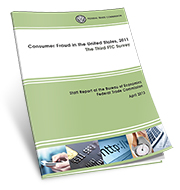At the Federal Trade Commission’s request, a U.S. district court entered a judgment against five individuals and the telemarketing operation they ran for violating the FTC Act and the agency’s Telemarketing Sales Rule (TSR). The court order permanently bars the defendants, who operated under a variety of names, including NHS Systems, Inc., from telemarketing, charging consumers’ bank accounts, and making false and misleading statements. It also requires them to pay almost $6.9 million, the amount their scheme took from defrauded consumers.
In entering the judgment, Judge Juan R. Sánchez wrote that, “All defendants have acted with reckless disregard for the financial interest and security of thousands of consumers. They have demonstrated their continued ability, desire, and success in committing the same deceptive acts. The danger of recurrent violations is real.”
The FTC’s complaint originally was filed as part of ‘Operation Tele-Phoney’, a 2008 crackdown on deceptive telemarketing. According to an amended complaint filed in 2009, the defendants used third-party telemarketers to unfairly and deceptively market and charge consumers for one or more discount health programs.
During sales calls, the telemarketers led consumers to believe they were from, or affiliated with, U.S. government agencies, including the Social Security Administration, the Internal Revenue Service, and Medicare. They promised consumers that they would receive substantial deposits into their bank accounts – in the form of grants, tax refunds, or tax rebates – if they first provided their account or credit card information. In many instances, the callers told consumers that they had been unconditionally selected.
In many cases, the defendants’ telemarketers also allegedly used deceptive tactics to obtain a “verification” of consumers’ authorization to charge their accounts, and often created false verification recordings. In some cases, the telemarketers told Medicare beneficiaries that they had to provide their financial information to continue receiving their benefits. In other cases, the defendants charged consumers’ financial accounts without any notice and without their authorization.
Consumers often were charged $29.95 to receive health care information, $299.95 to enroll in the program, and $19.95 per month thereafter, finding themselves in a “discount health care program” they never agreed to purchase.
In granting summary judgment against the NHS defendants, the court found that their conduct was unfair, as it “caused and was likely to cause substantial financial injury to the consumers.” The court also found that that their conduct was deceptive and that the defendants’ telemarketers made the alleged misrepresentations to consumers, in violation of the FTC Act.
Finally, the court found that the NHS defendants violated several provisions of the TSR by: 1) misrepresenting the total cost of the programs; 2) overcharging consumers; 3) charging consumers who were not enrolled in the healthcare program; 4) charging consumers to enroll in what was supposed to be a free program; 5) misrepresenting aspects of goods and services sold; and 6) using audio authorizations that did not comply with the Rule.
The judgment announced today resolves the FTC’s charges against the following individual defendants: 1) Nicole Bertrand; 2) Barry Kirstein; 3) David James Greer, also known as “Dannie Boie”; 4) Linke Jn Paul; and 5) Tasha Jn Paul, as well as the following corporate defendants: 1) NHS Systems, Inc., also doing business as (d/b/a) National Healthcare Solutions and National Health Net Online; 2) Plus Health Savings, Inc.; 3) Physicians Health Systems, Inc.; 4) Physician Health Service, LLC, also d/b/a American Health Benefits On Line; 5) Health Management, LLC; 6) 6676529 Canada, Inc.; 7) PHS Enterprises, Inc.; 8) First Step Management, Inc.; 9) Gold Dot, Inc.; and 10) Nevada Business Solutions, Inc.
The following defendants previously settled the FTC’s charges: 1) Harry F. Bell, Jr.; 2) John E. Bartholomew, Interface Management, Inc., and Beginning Again, Inc.; and 3) Donna Newman.
The FTC would like to acknowledge the Competition Bureau of Canada, the Royal Canadian Mounted Police, and the Centre of Operations Linked to Telemarketing Fraud (Project COLT) for their valuable assistance in bringing this action against NHS Systems, Inc. and the other defendants. Launched in 1998, Project COLT combats telemarketing-related crime, and includes members of the Royal Canadian Mounted Police, Sureté du Québec, Service de Police de la Ville de Montréal, Canada Border Services Agency, Competition Bureau of Canada, Canada Post, U.S. Homeland Security (U.S. Immigration and Customs Enforcement and the U.S. Secret Service), the U.S. Postal Inspection Service, the Federal Trade Commission, and the Federal Bureau of Investigation. Since its inception, Project COLT has recovered over $22 million for victims of telemarketing fraud.
The FTC also would like to thank the Office of the Inspector General, Social Security Administration, as well as the U.S. Postal Inspection Service for their valuable assistance.
The Federal Trade Commission works for consumers to prevent fraudulent, deceptive, and unfair business practices and to provide information to help spot, stop, and avoid them. To file a complaint in English or Spanish, visit the FTC’s online Complaint Assistant or call 1-877-FTC-HELP (1-877-382-4357). The FTC enters complaints into Consumer Sentinel, a secure, online database available to more than 2,000 civil and criminal law enforcement agencies in the U.S. and abroad. The FTC’s website provides free information on a variety of consumer topics. Like the FTC on Facebook, follow us on Twitter, and subscribe to press releases for the latest FTC news and resources.

